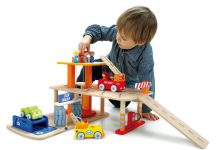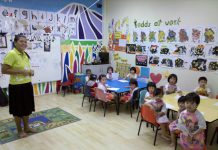An entire generation of children is growing up knowing only one main form of entertainment and engagement: the internet. What does this mean for parents and kids? Harini Chari finds out
It used to be that “networking” meant meeting people in person, having a meal and taking part in meaningful, interesting conversation. In today’s wired world however, “networking” has a rather different meaning. Better known as social networking, this is about a group of people coming together based on a common interest – except they “meet” online and interact with short messages. They can be “friends” without ever having to meet each other.
There are millions of people on the worldwide web at any given point in time who have immediate and relevant information on numerous topics and who are more than willing to share their experiences with others. These “social sites” are not limited to adults. There are several sites targeted at children and youth and they encourage kids to chat, post a profile, post videos and photos, blog and play games. Some examples are Webkinz or Club Penguin but more often than not, you can find youngsters on sites designed for adults such as Windows Live Spaces, YouTube, MySpace, Flickr, Twitter and Facebook.
The Good Bits
Like adults, children crave attention, they want to be valued and they want to be set apart from the rest. What social sites do is give them the chance to fill all of these needs. On Facebook for instance, they can be who they want to be, talk about school or friends, share pictures and ideas. Kids love an audience and the online platform offers just that. Experts say this is not a bad thing – in fact, interacting online boosts their confidence.
Another big plus is that there is interaction, unlike say the more passive mode offered by the television. By talking, playing games and being plugged in, kids are still active and it opens their minds to how others view the world too.
Possible Bad Bits
As with most things, dangers abound in any platform where large numbers of people congregate. The first one is ironically similar to old-fashioned communication – be wary of strangers. That there are predators online is not a big surprise to parents. But that they can be lurking in the most innocent of places could take an adult (and an unwitting, innocent child) by surprise. Very often, your child’s activity online makes his life an open book – this private information can make them susceptible to sexual predators or bullies.
PLAYGROUND RULES
Here’s the checklist to keep kids happy and safe online.
Set The Rules
A good time to set a few internet home rules would be when your child is ready to use the computer. Kids generally adhere and respond well to rules. So make sure to limit their time spent on the computer, know what they are surfing and offer other entertainment – like going to the park to play, a game of cards or just inviting their friends over for meals.
Photos
Photographs can reveal a lot of information. Teach your child to never add pictures with too much detail – like specific addresses or even names of schools. Teach them to be mindful of how others in the picture feel about having their photos posted too and to be respectful of that.
Full Names
Ensure that your child does not post his or his friend’s full names. A nickname could be used and one that does not attract the wrong attention.
Educate Yourself
Find out more about the site and if it keeps a check on the information posted. Also, visit your child’s page occasionally to find out what is being posted. If you find something you don’t like, don’t be quick to shut down the site and refuse access – remember that this is the new playground for all children, not just yours. Instead, talk about your fears, what you thought of it and why you think some restraint might be needed. Engagement works far more effectively than enforcement.
Limit Public Sites
Maybe you could suggest your child does not use a very public site. Some websites allow to password protect or limit the viewers who are known to your child.
Emotions Under Check
Children should be taught that some of the information that they post can be seen by many people even ones they don’t know. Kids do post essays, poems and their thoughts. Predators are always on the lookout for emotionally troubled or disturbed kids. So, do tell your kids not to say anything that is either too strong or that reveals their feelings.
Age Limits:
Children must be made to follow age restrictions. Most sites require the child to be at least 13 years of age. But the sites cannot be completely relied upon to ensure that underage kids are kept at bay so your vigilance matters.
Family E-mail
Create a family e-mail account. Also, be aware of and have access to all the passwords. Children might not like their privacy being invaded, but ultimately their safety is important and this point should be emphasized.
Communicate With Kids
No matter how old the child is, parents must have a good idea of what games their child is playing, with whom they are interacting and what they feel about the whole experience. Interact with your kid to find out how they enjoy these sites and be on the lookout for any signs. Children should also communicate with parents if they fear somebody or feel that they are in any form of danger.
The Big Picture
Scientists are now studying the effects that social networking sites have on children, especially if they start very young or spend a lot of time on it. One concern is how too much exposure too early can cause some negative effect on cognitive development – that the fast-paced nature of the net causes shorter attention spans in children is one potential problem.
The Wired Life
A study by the Broadcaster Audience Research shows that teenagers are now spending more than 7-and-a-half hours in front of the computer screen. Kids are constantly having online conversations or playing online games in make-believe environments. They are used to easy screen dialogues and this in turn affects how they do in real relationships and real play that involves teamwork and conversations with actual people.
According to Kaveri Subrahmanyam, a professor of psychology at California State University, children today spend their entire young lives on computers so their brains are more adaptable than those of adults to integrate online activities with their offline lives.
Despite the many benefits, the dangers are ever present and this is not something parents can wish away or undo – but considered parenting becomes crucial in navigating this generation. There is no substitute for proper monitoring and vigilance, rules and good rapport with your children, which would make the internet a wonderful place to play in and have fun with. So, the next time your 11-year-old asks you if he can go on Facebook, don’t be alarmed. Guide him through the process, educate him about the do’s and don’t’s and open up a whole new world to him!
Good Websites For Kids
Yahoo Kids (www.kids.yahoo.com)
It has a wide range of games, music, movies, jokes, sports, horoscopes, e-cards. It also has a StudyZone which has information on animals, reference materials. The best aspect is undoubtedly its child-friendly search engine, which only pulls up appropriate links.
Funology (www.funology.com)
This site is primarily entertainment-based. But it also has some interesting educational stuff like the Weird Science section where you can find fun experiments to do with your kids that teach them about physics, chemistry, biology, weather, and more. There are also many easy recipes to get little ones involved in the kitchen.
Funbrain (www.funbrain.com)
Funbrain masks learning through fun. This site allows kids to read blogs of other children with similar interests, and the site links words to dictionary definitions for learning on the go.
National Geographic Kids (kids.nationalgeographic.com)
Besides the games to keep kids interested, the real stuff lies in the People and Places section, Animals, Activities, Stories, and other educational links.
Webkinz (www.webkinz.com)
The biggest draw here is the games.
Imbee (www.imbee.com)
This is one of the relatively safe social networking sites.
Whyville (www.whyville.net)
This is another social networking site targeted at young kids. A filter removes and reports the use of foul language and every child needs a ‘chat license’ where they have to give a difficult test to obtain the license.










































